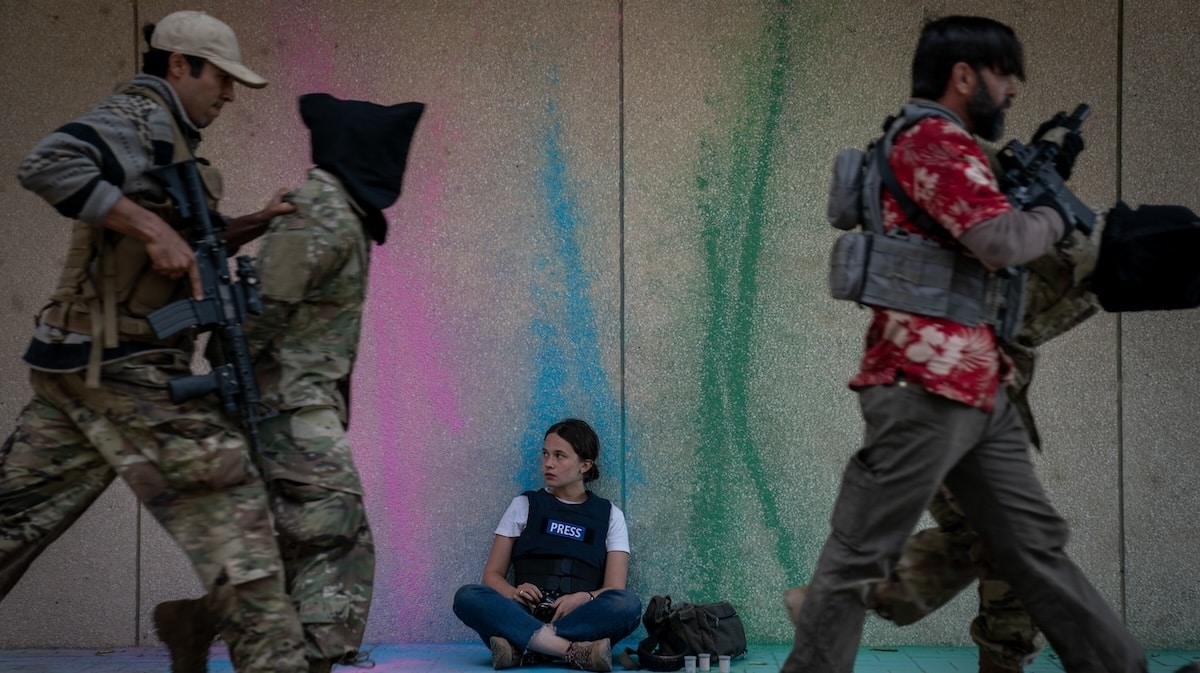I love everything Alex Garland has done so far. I’ve come to expect two things from his work: gorgeous cinematography and tackling Big Ideas. Civil War stuck to the former, but I’m unsure of the latter.
While I was a little underwhelmed, I still want to rewatch this if for no other reason than to spend more time marveling at shots like this:

Source: https://clutchpoints.com/civil-war-review-alex-garland-controversy
For a movie called Civil War, you would expect this to be a story about war. It wasn’t. It was a story about journalism.
I don’t know if this has been done this way before. A quick Google search reveals that The Killing Fields is about war journalists, but it seems that it is still a movie about war that the viewer sees through the eyes of the journalist protagonists. What’s interesting about Civil War is how much of the war is in the background. None of the four main characters are concerned with which side wins or what they are fighting over. They just want to be able to break a story.
There are several scenes where the journalists are following a group of armed men and women shooting at another armed group. It’s never clear what side is aligned with the president and his military and which is a secessionist group. There’s even a scene where one of the reporters asks a sniper who he takes orders from. The sniper dismisses the question as superfluous and basically says he’s just a guy trying to kill the guy who's trying to kill him. This was one of the most important parts of the movie.
The other important part comes at the end. When Jessie, the aspiring photojournalist, is pushed out of the way of gunfire by Lee, the well-established journalist. Lee is shot, and as she falls, Jessie takes her photo. Jessie gets up and the camera lingers on her as she looks back at Lee before leaving her dying mentor to get a photo of the president before he is executed. Whatever Big Idea Garland wants us to know about, it takes place in that scene.
I think there are two ways to interpret that moment and the Big Idea it reaches at. One is that Jessie became wrapped up in a cause that overwhelmed her ability to see the humanity in her fellow citizens. This would apply to the soldiers on both sides of the conflict as well, whose cause became putting their respective people in control of the government. Jessie’s cause was journalism, getting the story, informing the public, etc. It became more important to get a photo of her dying colleague than to her camera down and hold Lee's hand in her final moments.
The other interpretation is that Jessie had a hero complex. She admired, almost worshiped, Lee and her work as a photojournalist. Jessie could even recite Lee’s Wikipedia page. Jesse became so obsessed with wanting that level of status that it became more important to get a great shot than to be there for Lee, who had just saved her life.
Either way, I think Garland is trying to say something about human connection. A common criticism I read about the film was that it resisted explaining how things got to be the way they were. Maybe, to Garland, the answer isn’t an over militarized police state, soft-on-crime politicians, runaway inflation, massive inequality, loss of natural resources, capitalism, communism, or some other poor policy choice. Maybe what leads to civil war is when we stop seeing one another as our brothers and sisters, all deserving of respect and dignity, and instead see them as means to an end.
No comments:
Post a Comment